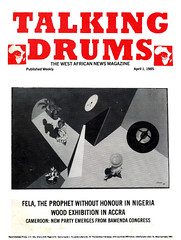OPEC reaches a plateau
By Ben Mensah
Each member of the organisation is now more concerned with finding ways and means of selling its oil. Algeria has announced that it is cutting the price of crude oil by a dollar a barrel, Nigeria is exchanging its oil for Brazilian goods and Saudi Arabia has arranged to pay a fleet of French mirage fighter aircraft with oilThat there has been a major change in the structure of oil market away from term contracts and towards spot and short term transactions was the explanation given by the British Minister of State for Energy, Mr Alick Buchanan-Smith for the dissolution of the British National Oil Corporation.
In the British House of Commons, the Minister said, "In these circumstances BNOC could avoid the risk of losses only by linking its prices for participation in oil closely and continuously to movements in spot market".
For Britain which is the world's fifth largest oil producer the decision implied an instant loss of revenue as north sea prices slipped to world spot market levels. But such loss could be offset by increased production which under normal circumstances should have been resisted by the Organisation of Petroleum Exporting Countries (OPEC) which has sustained its existence and price structure through production cuts.
On previous occasions when Britain cut its oil price and raised production the OPEC members threatened her with a price war. Nigeria in particular whose low sulphur grade oil compares with Britain's north sea oil did not merely rave and rant. She went ahead to cut her oil price with the oil minister, Professor Tam David-West asserting that Nigeria's national interest and not that of OPEC or any other country's comes first in fixing her oil price.
This time however, the OPEC members have merely expressed the hope that Britain will remain committed to stabilising the world oil market.
Dr Mana Saeed Otaiba, Oil Minister of the United Arab Emirates said, "I personally believe the producers whether in or outside OPEC are in the same boat and have the same interests".
Nigeria's Professor David-West sounded even more helpless when he conceded that his country's earlier threat to match any price cut by Britain was no longer relevant. The British government which had feared that any move to disturb the oil pricing structure would not only be met with outrageous reaction from OPEC but also a further weakening of the pound sterling on the money market certainly took advantage of the ending of the year long miners strike in Britain to effect this fundamental change in its energy policy.
Fortunately, the decision has coincided with a dramatic fightback in the value of the pound against the American dollar and above all the escalation of the Gulf war between two OPEC members - Iraq and Iran.
The Gulf war in particular which has adversely affected the supply of oil on the world market and thereby stabilised prices has prevented the dissolution of the British oil company from having the dreaded effect of bringing down prices and thereby saved Britain from the wrath of OPEC members.
It is over twelve years since the shock of the first oil price hike forced many developing nations into steep debts and showered the oil producing countries with surplus revenue.
Nigeria's Professor David West sounded even more helpless when he conceded that his country's earlier threat to match any price cut by Britain was no longer relevant
The western developed nations were equally shocked by the policies of this oil cartel but managed quickly to woo the surplus funds of the oil producers into their banks and from which they lent to the developing countries.
In the process, they made huge profits but their initial anger over the activities of the oil cartel persisted. The strategy therefore was to destroy OPEC. This objective appears to have been reached now following OPEC's helplessness in reacting to the dissolution of the British oil corporation.
Each member of the organisation now is more concerned with finding ways and means of selling its oil. Algeria has announced that it is cutting the price of crude oil by a dollar a barrel. Ecuador has refused to open its books to the new OPEC auditing commission monitoring prices and output, Nigeria is exchanging its oil for goods from Brazil, and Saudi Arabia has arranged to pay the French government in oil for a fleet of mirage fighter aircraft. As for Iraq and Iran, they are more winning the Gulf war than bothering concerned about about the threat to the existence of OPEC.
Could these be veritable signs that OPEC has reached a plateau and will soon decline in influence?
